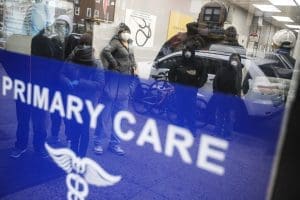Advocates to Congress: Don't use relief bill to discriminate against LGBTQ Americans
Nearly 200 groups sent a letter this week demanding that future relief legislation be inclusive of all people.

Nearly 200 organizations, including progressive think tanks and LGBTQ advocacy groups, sent a letter to members of Congress this week, asking them to include language that bars anti-LGBTQ discrimination in any programs and services funded by coronavirus relief legislation.
Lambda Legal, the Human Rights Campaign, the Center for American Progress, and the National LGBTQ+ Task Force Action Fund were among the groups that signed the letter sent to House Speaker Nancy Pelosi, Senate Minority Leader Chuck Schumer, House Minority Leader Kevin McCarthy, and Senate Majority Leader Mitch McConnell on Monday.
The groups urged Congress to include provisions in response legislation that clarifies no one eligible for these programs and services should be excluded from participation in them, denied their benefits, or face discrimination in how the programs and services are administered based on sex.
The letter makes it clear that “sex” includes sexual orientation, gender identity, pregnancy, and childbirth.
The groups also called for any legislation to include language prohibiting discrimination based on age, disability, race, immigration status, national origin, and religion. They asked that Congress ensure that any recipients of funds provided in COVID-19 relief packages treat all legal marriages as valid.
“LGBTQ people have long faced discrimination in the health care system which has negatively impacted their health outcomes and has additionally made them wary of accessing services in the first place,” they wrote. “…We must not exacerbate existing health and economic inequities by allowing qualified individuals to be turned away from federally funded services.”
Congress has been working on more COVID-19 relief legislation, including an aid bill for businesses and hospitals that includes $350 billion for a small business lending program, $75 billion for hospitals, and $25 billion to expand testing.
Rea Carey, executive director of the National LGBTQ+ Task Force Action Fund, spoke out about the need for the things outlined in the letter, in a statement to the press this week.
“As a queer, gender non-conforming woman, I worry about the people I know and love who are not currently explicitly protected from discrimination in the programs Congress has created or strengthened in the wake of our current economic and health crisis,” Carey said.
“If someone like me, a woman with short hair who dresses in more masculine attire, was laid off their job tomorrow, they could legally be turned away from a soup kitchen, homeless shelter, or in some cases government programs because of gaps in our nation’s civil rights laws.”
House Democrats tried to rectify the discriminatory gaps in congressional legislation last year when they voted to pass the Equality Act, which would amend the Civil Rights Act of 1964 to make it explicit that the law bans discrimination on the basis of gender identity and sexual orientation.
Under the Equality Act, LGBTQ people would have stronger protections against discrimination in housing, employment, education, federal programs, jury service, public accommodations, and credit and lending.
Only 22 states, two territories, and the District of Columbia explicitly prohibit discrimination based on sexual orientation and gender identity.
One hundred and seventy-three Republicans voted against the bill. Only eight Republicans voted for the legislation.
The Senate, where Republicans have a majority, did not take up the legislation. Donald Trump opposed the bill.
Legal advocacy groups have argued that LGBTQ people should already be protected under federal law because discrimination against them is a form of sex discrimination. The U.S. Supreme Court heard arguments last year on whether those workers are protected by Title VII of the Civil Rights Act of 1964.
The court could announce its opinion as soon as this week.
Published with permission of The American Independent Foundation.
Recommended

Biden campaign launches new ad focused on Affordable Care Act
Former President Trump has said he wants to do away with the popular health care law.
By Kim Lyons, Pennsylvania Capital-Star - May 08, 2024
Ohio doctors fear effects of emergency abortion care case set to go before U.S. Supreme Court
A federal law that allows emergency departments to treat patients without regard to their ability to pay will be under U.S. Supreme Court scrutiny this week, and Ohio doctors are concerned about the case’s local impact on emergency abortion care.
By Susan Tebben, Ohio Capital Journal - April 23, 2024
House GOP votes to end flu, whooping cough vaccine rules for foster and adoptive families
A bill to eliminate flu and whooping cough vaccine requirements for adoptive and foster families caring for babies and medically fragile kids is heading to the governor’s desk.
By Anita Wadhwani, Tennessee Lookout - March 26, 2024












































































